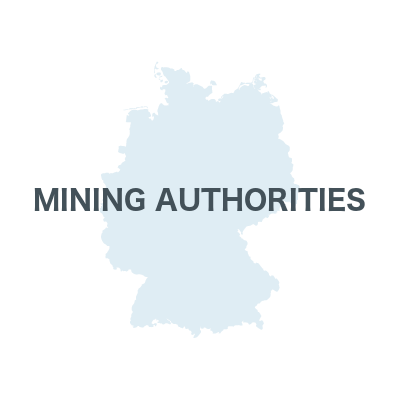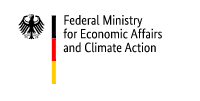Who is responsible?
Laws and responsibilities of public authorities
Latest Update: September 2023
The extraction of raw materials is regulated in Germany by regulations such as the German Federal Mining Act (BBergG). In 1982, it replaced the old mining laws of the Federal States and the numerous ancillary mining laws of the Federal and Federal State governments. The BBergG is supplemented by various ordinances on mining law issues. The overall control of the mining law within the Federal Government is the responsibility of the Federal Ministry for Economic Affairs and Climate action. The mining authorities of the Federal States (see chart below) implement the BBergG and also bear the responsibility for the authorisation and supervision of mining activities (depending on the natural resources in question). The Federal States have passed some mining regulations of their own in order to meet the specific requirements and characteristics for areas not covered by the BBergG. The coalition agreement provides for the modernisation of mining law. However, a draft bill for the modernisation of mining law is not yet available.
Germany differentiates between three groups of natural resources in terms of their legal regulation:
- Free-to-mine natural resources are not the property of the landowner. The exploration and extraction of these natural resources are subject to the BbergG and must be approved by the mining authorities of the respective Federal State in a two-stage procedure: firstly, by granting a mining license(public-law concession) and secondly, by granting the site-specific approval of the operating plan procedure.
- Privately-owned natural resources are the property of the landowner and are subject to mining law (see § 2(1), no. 1 BBergG). The prospecting and extraction of these mineral resources does not require any mining authorisation, but is subject to approval (operating plan procedure) by the mining authorities of the Federal States.
- Landowners’ natural resources are natural resources that are neither free-to-mine nor privately owned. They are the property of the landowner. They are not subject to mining law and the supervision of the mining authorities. The approval procedure for landowners’ natural resources is carried out in accordance with the regulations of the Federal Immission Control Act (BImSchG) or in accordance with regulations of the respective Federal State (e.g. excavation, water and construction laws).
Depending on the Federal State, the natural resource and the type of extraction involved, middle and lower-management levels of governmental bodies are responsible for the landowners’ natural resources category.
Overview of the mining authorities of the Federal States
Baden-Wuerttemberg
- Ministry of the Environment,
- Climate Protection and the Energy Sector
Bavaria
- Ministry for Economic Affairs, Regional Development and Energy
Berlin
- Senate Department for Economics, Energy and Public Enterprises
Baden-Wuerttemberg
- Ministry for the Environment,
- Climate and Energy.
Bavaria
-
State Ministry for Economic
Affairs -
and Media, Energy and
Technology
Berlin
-
Senate Administration for Economic
Affairs, - Technology and Research
Brandenburg
- Ministry for Economic Affairs, Labour and Energy
Bremen
- The Senator for Economic Affairs,
- Labour and Europe
Hamburg
- Authority for Economic Affairs and Innovation
Brandenburg
- Ministry for Economic
- Affairs and Energy
Bremen
- Senator for Economic Affairs,
- Labour and Ports
Hamburg
- Department of Economic Affairs,
- Transport and Innovation
Hesse
- Ministry for Environment, Climate Protection, Agriculture and Consumer Protection

Mecklenburg-Western-Pomerania
- Ministry for Economy, Infrastructure
- and Tourism and Labour
Hesse
- Ministry for the Environment,Climate Protection,
- Agriculture and Consumer Protection

Mecklenburg-Western-Pomerania
- Ministry for Energy, Infrastructure
- and Regional Development
Lower Saxony
- Ministry for Economic Affairs, Labour, Transport and Digitalisation
North-Rhine Westphalia
- Ministry of Economic Affairs, Industry, Climate Action and Energy
Lower Saxony
- Ministry for Economic Affairs, Labour and Transport
North-Rhine Westphalia
- Ministry for Economic Affairs,
- Innovation, and Energy
Rhineland-Palatinate
- Ministry for Economic Affairs, Transport, Agriculture and Viticulture
Saarland
- Ministry for Economic Affairs,
- Innovation, Digital Affairs and Energy
Saxony
- Ministry for Economic Affairs,
- Labour and Transport
Rhineland-Palatinate
- Ministry for Economic Affairs, Climate Protection,
- Energy and Regional Planning
Saarland
- Ministry for Economic Affairs,
- Labour, Energy and Transport
Saxony
- Ministry for Economic Affairs,
- Labour and Transport
Saxony-Anhalt
- Ministry for Economic Affairs, Tourism, Agriculture and Forests of Saxony-Anhalt
Schleswig-Holstein
- Ministry of Energy, Agriculture, the Environment, Nature and Digitalization
Thuringia
- Ministry of Environment, Energy, and Nature Conservation
Saxony-Anhalt
- Ministry for Sciences
- and Economic Affairs
Schleswig-Holstein
-
Ministry for Energy Transition,
Agriculture - the Environment and Rural Areas
Thuringia
-
Ministry for Agriculture, Forests,
the Environment and Nature - Conservation
Legal regulation
Legal division of natural resources in Germany
natural resources | |||
Legal | Free-to-mine natural resources (subject to mining law) | Privately-owned natural resources (subject to mining law) | Landowners’ natural resources (not under mining law) |
Subject-specific division | Energy resources: coals, hydrocarbons (including oil and natural gas), geothermal energy Industrial minerals: fluorite, graphite, lithium, phosphorus, all salts that are readily soluble in water, sulphur, barite, strontium, zirconium Metal ores: e.g. iron, copper, lead, zinc ores, etc. Also: all natural resources in the area of the continental shelf and coastal waters (including gravel and natural stones)1 | Industrial minerals: bentonite and other montmorillonite clays, feldspar, mica, kaolin, diatomaceous earth (diatomite), ‘pegmatite sand’, quartz (quartz sand and gravel) & quartzite (if suitable for refractory products and ferrosilicon production), soapstone, talk and clay (if fireproof and acid-proof). Quarried natural resources: basaltic lava (except columnar basalt), roofing slate, trass. Also: all privately-owned natural resources, which have been extracted underground (incl. gypsum, natural stone, brick clays etc.). | Quarried natural resources (in opencast mining): anhydrite, gypsum, limestone, basalt columns and other natural stones, gravel and sand, quartz and quartzite (if unsuitable for the manu- facture of refractory products and ferrosilicon) and other natural resources not listed in this table Also: peat |
Right of disposal over natural resources | These natural resources are “free”, i.e. they do not belong to the landowner. Their exploitation requires mining rights and the permission of the mining authorities. | These mineral resources belong to the landowner. The landowner is entitled to use them. | |
Type of | Regulated pursuant to the BBergG § 3 (3) § 3 (4) | Governed by other legal jurisdictions, e.g., construction law (Excavation Law), Water Resources Act or State Water Act, Federal Immission Control Act, Federal or State Nature Conservation Act. | |
Own presentation. Based on the following source: State geological service of the Federal Republic of Germany
URL: Infogeo – Staatliche Geologische Dienste Deutschlands – Rohstoffsicherung in der Bundesrepublik Deutschland – Zustandsbericht – (Accessed: 5 December 2022)
1In the territory of the former GDR, special requirements may exist for free-to-mine natural resources under the Unification Treaty.


